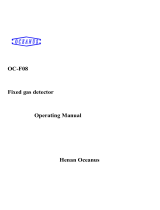
RAEGuard
S
EC / LEL / IR User’s Guide
1. General Information
RAEGuard
S
EC The RAEGuard
S
EC is a fixed electrochemical
detector for oxygen and toxic gas (CO, H
2
S, SO
2
, NO, NO
2
, Cl
2
, O
2
,
ClO
2
, NH
3
, PH
3
, HCN and ETO). It operates with voltages from 9 to
36 VDC and provides an analog (4 to 20mA) output signal and digital
(RS-485, ModBus) output signal within the corresponding ranges of
gas detection. The RAEGuard
S
EC uses an interchangeable
electrochemical smart sensor, which can be pre-calibrated
independently offline. Housed in an explosion-proof enclosure, the
RAEGuard
S
EC is equipped with a local digital display of the gas
concentration and unit of measurement, status LEDs, and function
keys for performing calibration.
RAEGuard
S
IR The RAEGuard
S
IR is fixed non-dispersive infrared
(NDIR) detector for hydrocarbon combustible gases, carbon dioxide,
and other gases, It operates with voltages from 9 to 36 VDC and
provides an analog (4 to 20mA) output signal and digital (RS-485,
ModBus) output signal within the corresponding ranges of gas
detection of 0 to 100% LEL or 0 to 50,000 ppm CO
2
. The RAEGuard
S
IR uses a smart NDIR sensor, which can be pre-calibrated
independently offline. Housed in an explosion-proof stainless steel
enclosure, the RAEGuard
S
IR is equipped with a local digital display
of the gas concentration, status LEDs, and function keys for
performing calibration.
RAEGuard
S
LEL The RAEGuard
S
LEL is a fixed, highly poison-
resistant catalytic bead lower explosion limit (LEL) sensor for
combustible gases detection. It operates with voltages from 9 to 36
VDC and provides an analog (4 to 20mA) output signal and digital
(RS-485, ModBus) output signal within the corresponding range of 0
to 100% LEL. The RAEGuard
S
LEL uses a smart LEL sensor, which
can be pre-calibrated independently offline. Housed in an explosion-
proof stainless-steel enclosure, the RAEGuard
S
LEL is equipped with
a local digital display of the gas concentration, status LEDs, and
function keys for performing calibration.
3





















